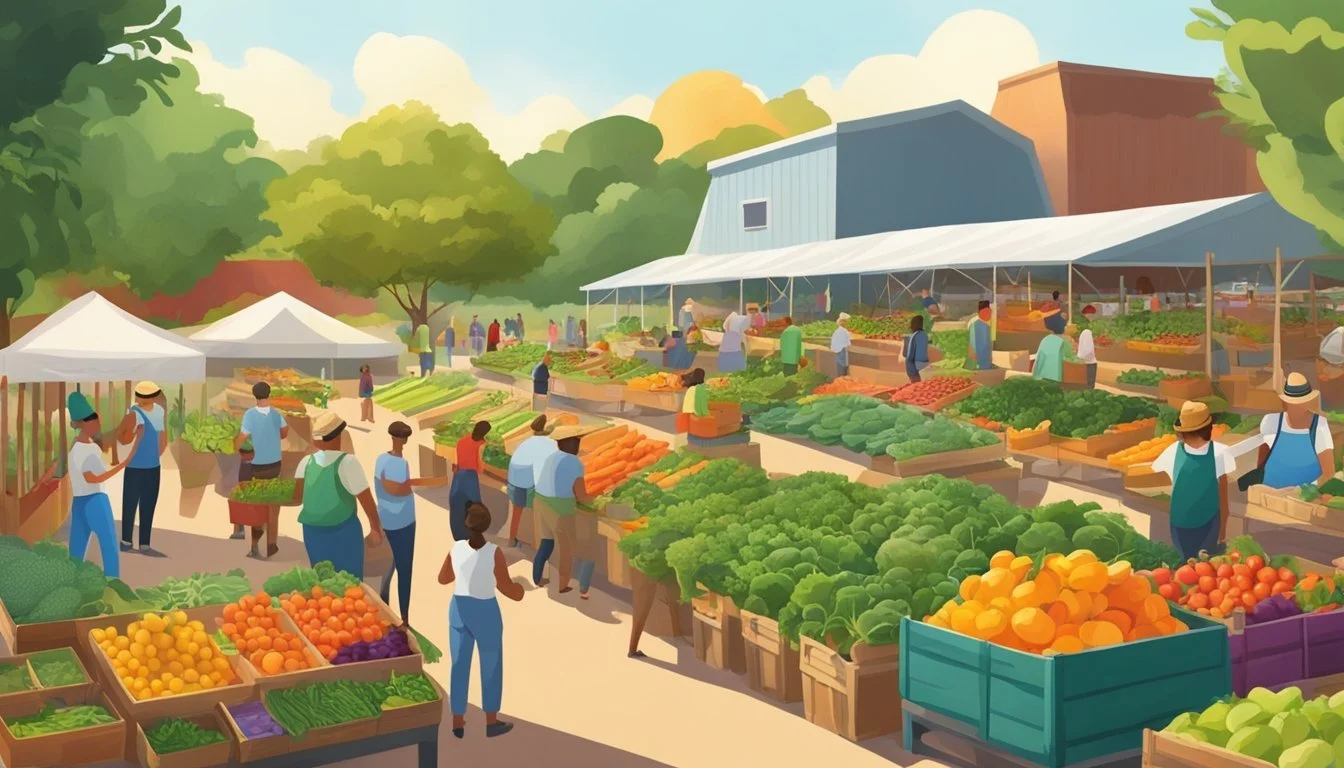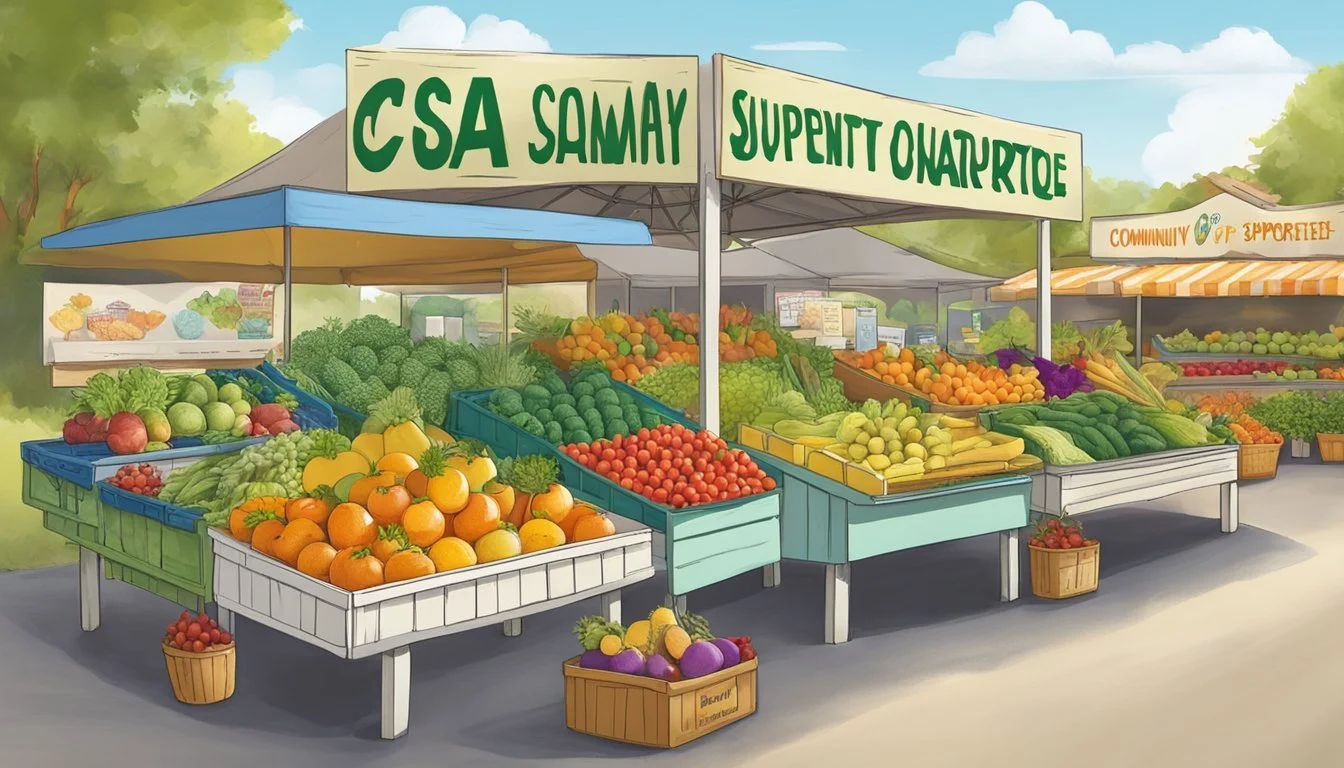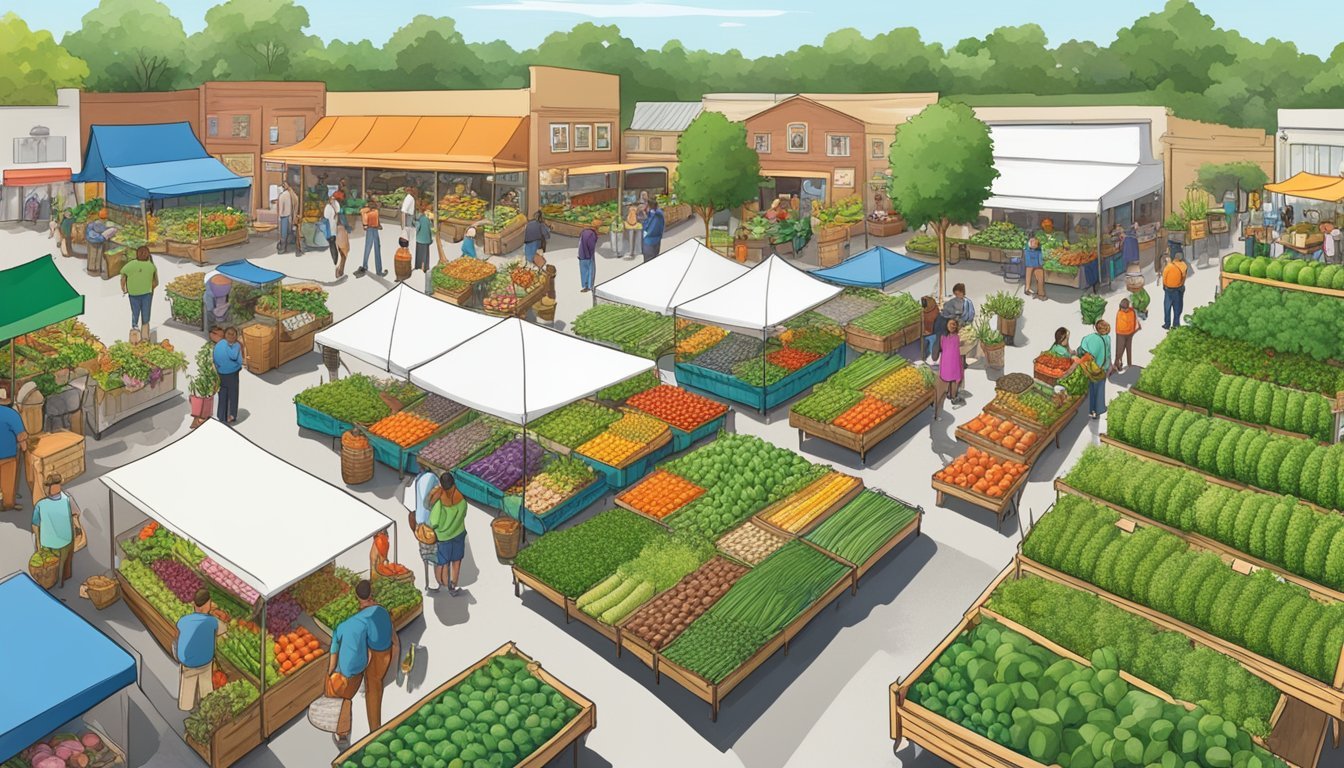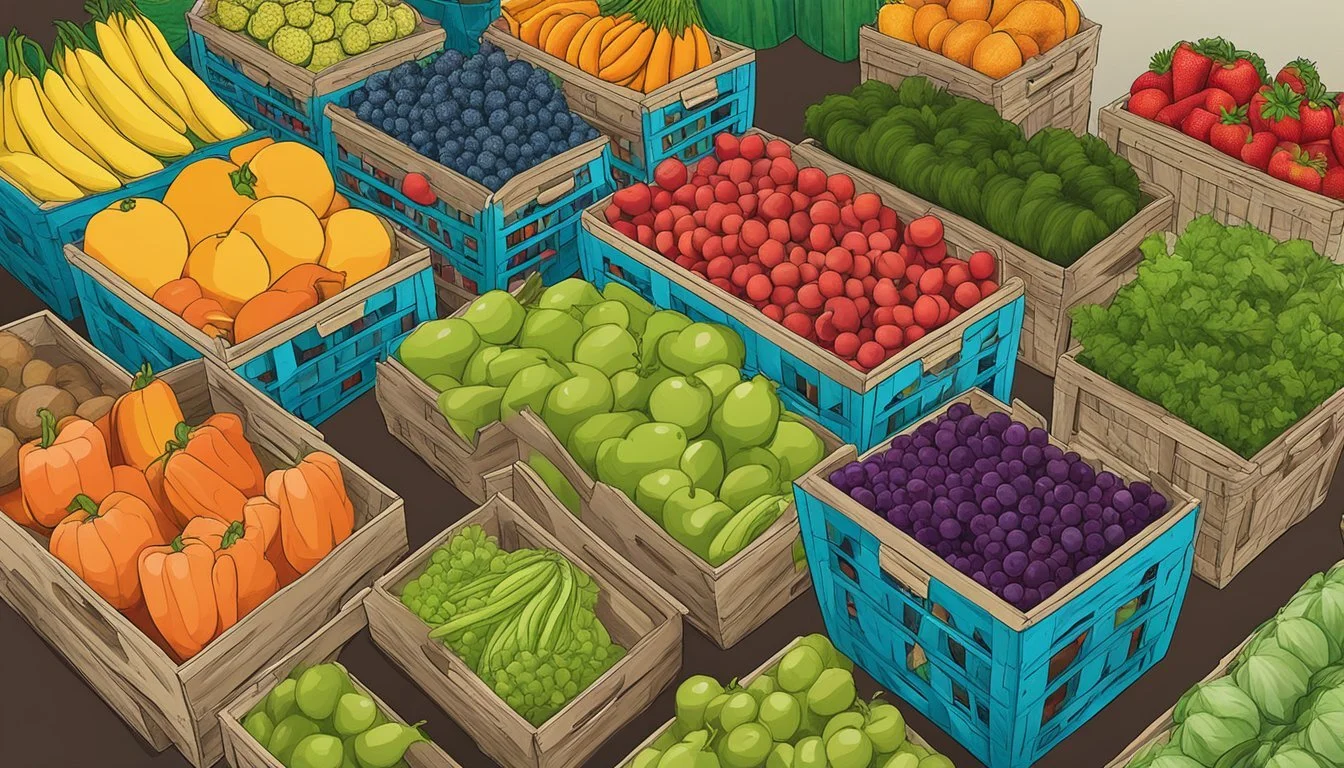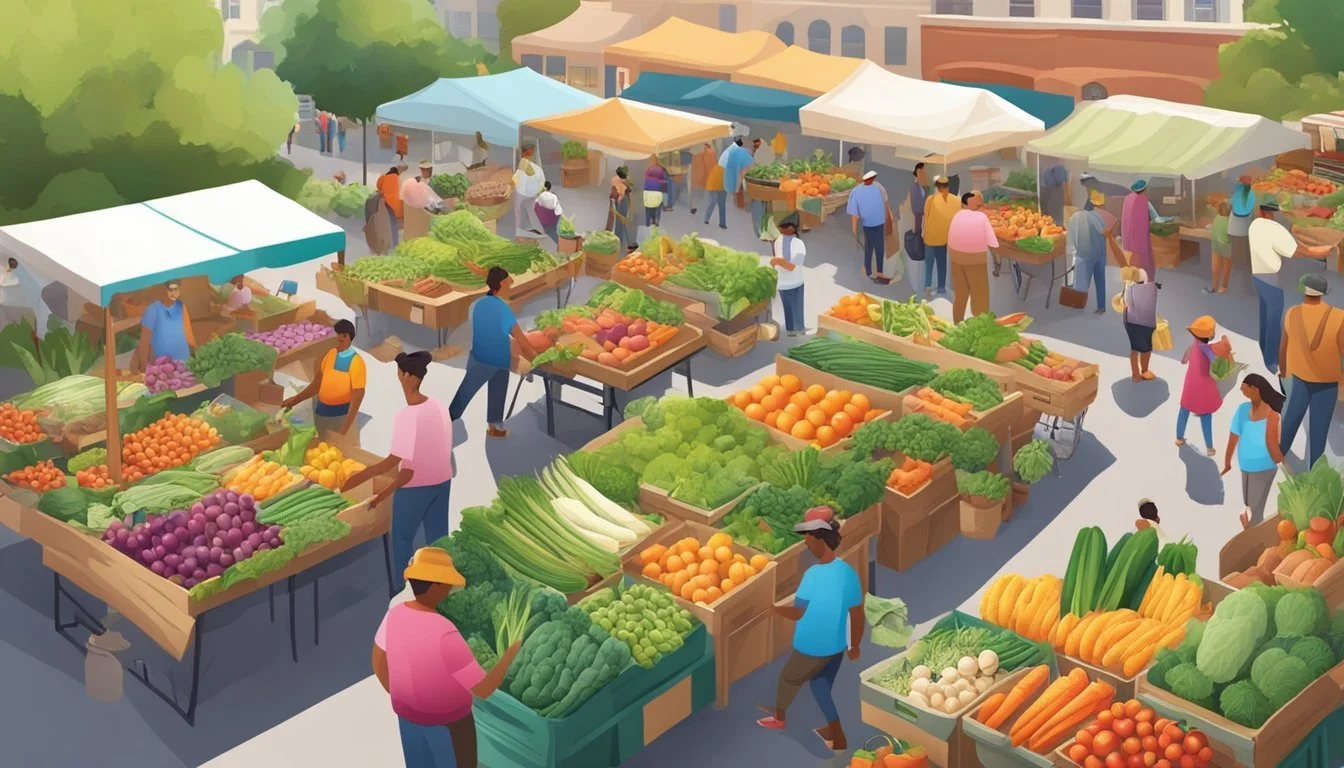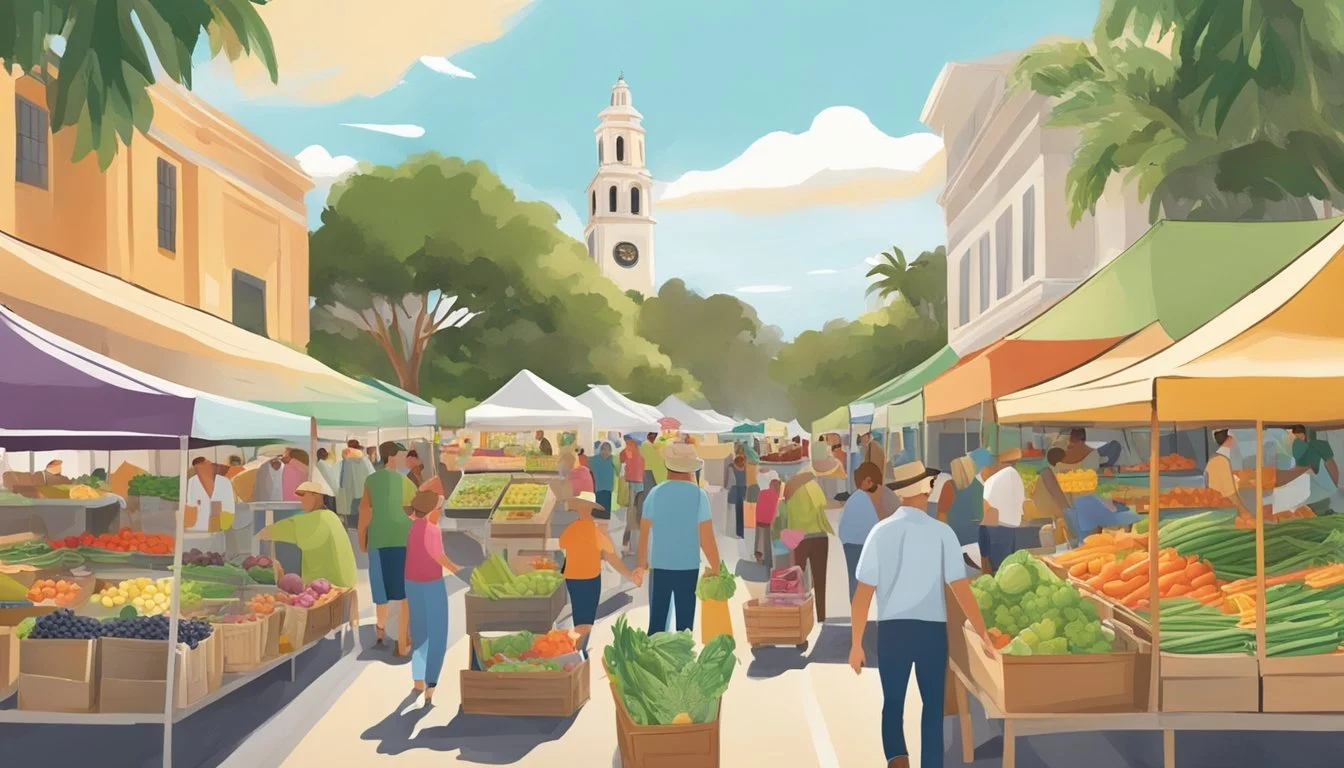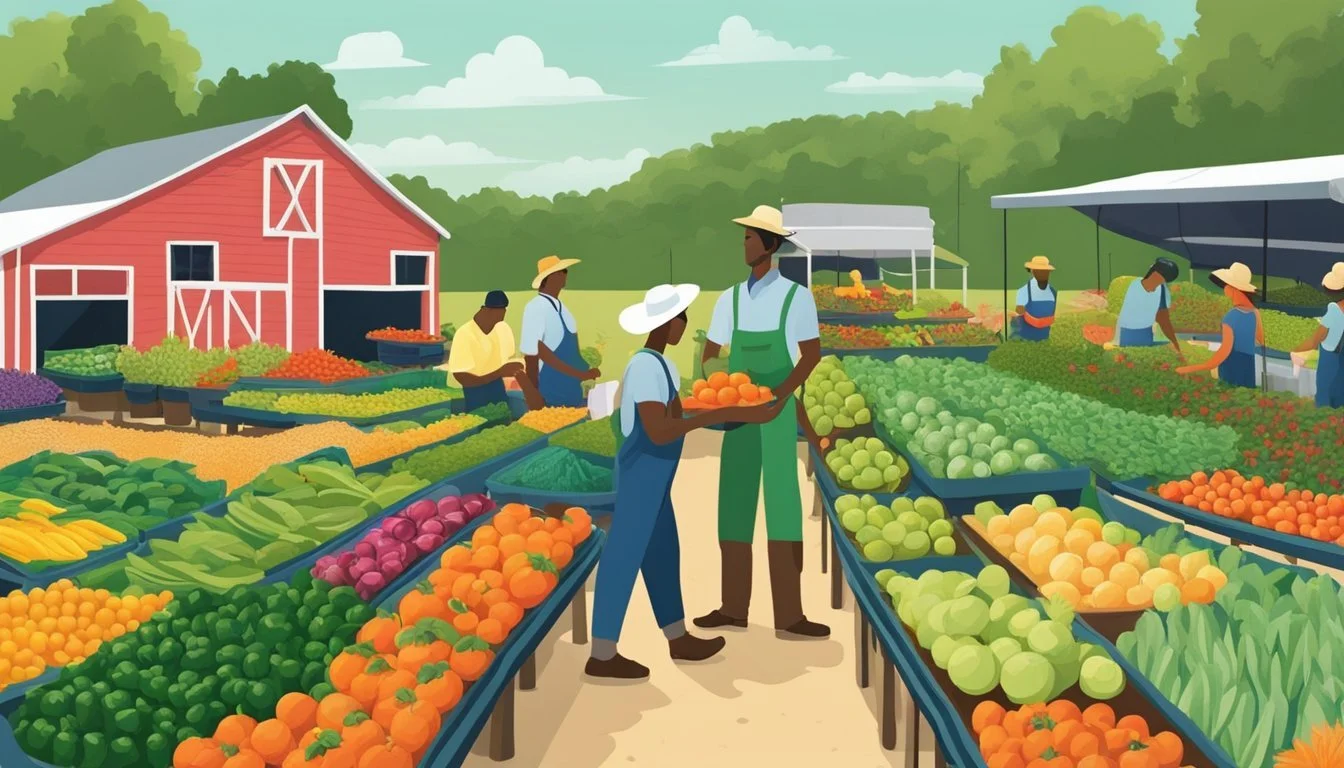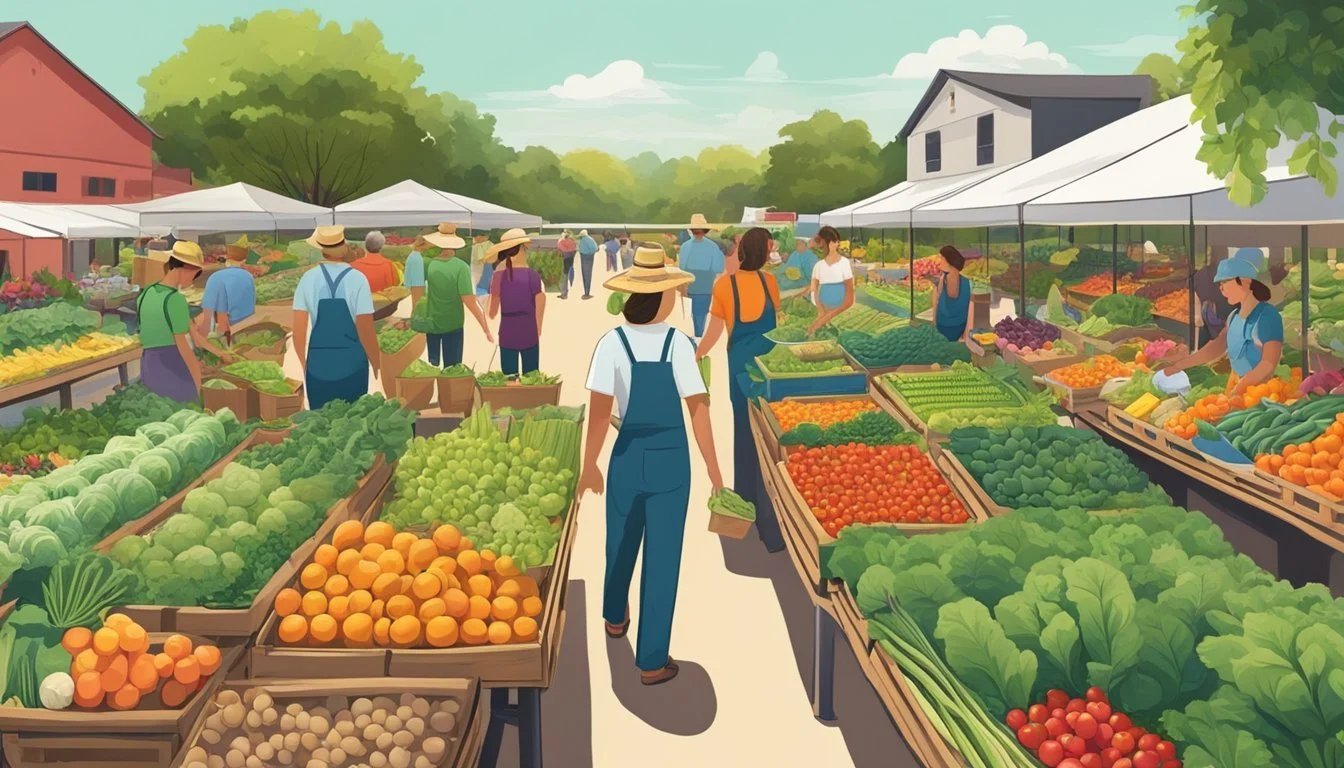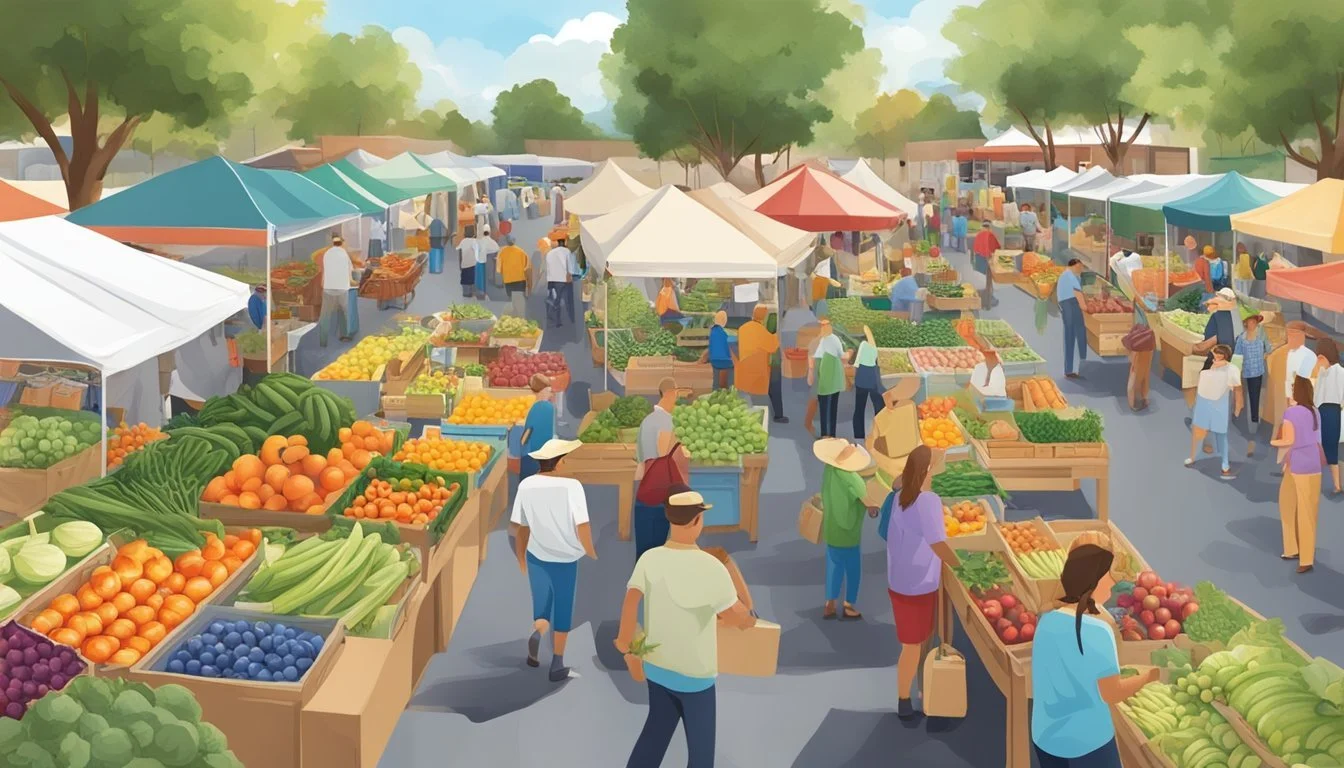Community Supported Agriculture (CSA) in Davie, FL
A Guide to Local Farm Partnerships
Community Supported Agriculture, known as CSA, is a model that has taken root in Davie, FL, offering residents a direct way to purchase fresh and local produce. This agricultural approach allows consumers to buy seasonal food directly by purchasing shares from local farms. When they sign up for a CSA program, members typically receive a weekly or bi-weekly box of vegetables, fruits, and other farm products from participating farms in the region.
Davie, FL, with its conducive climate and agricultural heritage, has a selection of farms that participate in CSA programs. These programs support local farmers by providing them with a consistent market and also offer community members access to fresh, high-quality produce. The relationship between consumers and farms in a CSA is symbiotic; while members get to enjoy the bounty of locally grown goods, farmers are assured a reliable customer base for their harvest.
Local farms around Davie play a critical role in promoting sustainable agriculture through CSA programs. By engaging with CSAs, residents of Davie not only contribute to the local economy but also foster community relationships and advocate for environmentally responsible farming practices. With a focus on seasonality and community, CSAs in the area are an integral part of a larger movement toward food system transparency and agricultural accountability.
Understanding CSAs
In Davie, FL, Community Supported Agriculture (CSA) offers residents the opportunity to form a relationship with local farm operations, securing shares of fresh produce while providing mutual support to farmers.
Community Supported Agriculture Basics
Community Supported Agriculture (CSA) is a model where consumers purchase membership shares of a farm's anticipated harvest. These shares are typically paid for at the start of the growing season, reflecting a commitment to the local farm operation. Members of a CSA usually receive weekly or bi-weekly deliveries or pick-ups of farm produce, which may include a variety of vegetables, fruits, and sometimes other products like eggs or honey.
Benefits of Joining a CSA
Joining a CSA has several advantages for members:
Fresh and Local: Members enjoy fresh, locally grown produce, which often surpasses what is available in traditional retail settings in both freshness and taste.
Supporting Local Economy: By participating in a CSA, members directly support local farmers and contribute to the sustainability of local agriculture.
Educational Aspect: Membership often includes opportunities to learn more about the farming process, seasonal crops, and sustainable agriculture practices.
Shared Risks and Rewards
The CSA model is grounded in the concept of shared risk. If the harvest is abundant, members benefit from the large variety of produce; in cases of a poor harvest due to factors like bad weather, members share the risk:
Scenario Member Satisfaction Impact on Farm Operation Abundant Harvest High satisfaction; varied produce Farm thrives; strengthened community ties Poor Harvest Lower satisfaction; reduced produce Financial stability due to prepaid shares
This model fosters a deeper relationship and sense of community between consumers and farmers, emphasizing the importance of mutual support and community-supported wellbeing.
Local Agriculture Impact
Community Supported Agriculture (CSA) in Davie, FL, significantly influences local economies, strengthens the local food system, and promotes environmental stewardship through sustainable farming practices.
Contribution to Local Economies
CSAs are vital to Davie’s economy. When community members purchase shares from local farms like Scooby’s Organic Farm, they contribute directly to the financial stability of these agricultural businesses. These funds help farms cover their operational costs and facilitate investments in local agriculture, leading to job creation and economic growth within the community.
Job creation at farms and markets
Reinforcement of the local agriculture sector
Advantages of Local Food Systems
The local food system in Davie is bolstered by CSAs. Farmers markets, such as the one hosted at Scooby’s Organic Farm, provide a venue for residents to access seasonal produce, dairy, and poultry products that are fresher and often more nutritious than those available at supermarkets. This direct farm-to-consumer model fosters a closer relationship between producers and consumers, enhancing the community's food literacy and appreciation for local agriculture.
Benefits of Local Food Systems:
Increased access to fresh, seasonal produce
Enhanced consumer-farmer relationships
Environmental Benefits and Land Stewardship
Sustainable food production is a hallmark of local CSA operations. These farms prioritize land stewardship, working to minimize their impact on the environment through responsible agricultural practices. They contribute to biodiversity, soil health, and reduced carbon emissions by focusing on sustainable food practices and reducing the reliance on long-distance food transportation.
Environmental Practices:
Farms employing crop rotation and organic farming methods
Reduction in food miles due to proximity to consumers
By supporting local CSAs, the community of Davie plays an active role in promoting sustainable agriculture, which in turn aids in preserving the local environment for future generations.
CSA Membership Details
Community Supported Agriculture (CSA) in Davie, FL, provides an opportunity for consumers to participate directly in the growing process by purchasing memberships. These memberships entitle consumers to a share of the harvest throughout the agriculture season.
How to Join a CSA
Individuals interested in joining a CSA typically sign up during the enrollment period which often occurs before the growing season begins. To initiate membership, one usually contacts the local CSA farm of choice, either through their website, at a farmers' market, or by visiting the farm directly. It's crucial to act promptly, as spaces can be limited due to the nature of the harvest.
Understanding CSA Shares
CSA memberships are often structured around the concept of "shares," which represent a portion of the farm's production. Typically, a Full Share is designed to meet the needs of a small family or a couple of vegetarians, and a Half Share may be better suited for an individual or smaller households. Shares usually include a variety of vegetables and may also contain fruits, herbs, and other farm-produced goods.
Subscription Models and Payments
CSA farms in Davie may offer different subscription models:
Traditional Model: Members pay for the entire season upfront. This model supports the farmer with early season capital.
Flexible Model: Allows for payment installments or even a pay-as-you-go system for those who cannot afford upfront costs.
Payment methods vary, with many CSAs accepting cash, checks, credit cards, and sometimes even online payments. Some CSAs may offer discounted rates for early sign-ups or installment plans to accommodate different budget needs. Membership fees are typically considered non-refundable, as they fund the initial costs of the farming season. It is important for members to understand the payment terms before joining.
CSA Offerings and Produce
Community Supported Agriculture in Davie, FL, provides a broad range of locally sourced products that tap into the rich agricultural base of the region. Consumers have the opportunity to experience fresh produce and additional farm products while supporting the local economy.
Seasonal Varieties of Produce
At the heart of Davie's CSA offerings are the seasonal varieties of produce. The CSAs typically offer a vibrant selection of vegetables and fruits, reflective of South Florida's growing seasons. In the spring, one might find tender leafy greens and crisp radishes, while the autumn shares might include robust squashes and hearty root vegetables. These offerings vary from farm to farm, but each aims to provide a bountiful assortment of produce that is at its peak:
Spring: Tomatoes, Peppers, Cucumbers
Summer: Corn, Melons, Berries
Fall: Squash, Eggplants, Apples
Winter: Citrus fruits, Leafy greens, Root vegetables
Non-Produce Items in CSA Shares
Beyond produce, CSA shares in Davie often include a range of non-produce items. Participants might find farm-fresh eggs, meat, and cheese incorporated into their weekly or monthly boxes. Some CSAs might also offer a delightful array of flowers and aromatic herbs, adding not only variety but also enhancing the culinary experience. These items are generally produced with the same dedication to quality and local ethos as the fruits and vegetables.
Exploring Organic and Artisanal Options
Davie's CSA programs place a significant emphasis on organic and artisanal options. Organic CSAs adhere strictly to natural growing practices, avoiding synthetic pesticides and fertilizers to deliver produce that meets rigorous organic standards. Artisanal products are often handcrafted with meticulous attention to detail, whether it be a small-batch goat cheese or a loaf of sourdough bread made from locally milled grains. The result is a share filled not just with food, but with products that embody the craft and care of local producers.
Engaging with the CSA Community
When residents of Davie, FL become part of a Community Supported Agriculture program, they embark on a journey of deeper connection with their local food system. Participating in CSA-related activities not only nourishes the body but also enriches community ties and understanding of sustainable agriculture.
Community Events and Farm Visits
CSAs in Davie often host community events intended to bring together members and farmers for celebrations of harvest, seasonal festivities, and educational workshops. These events provide insight into farming practices and offer firsthand experience in agriculture. A typical gathering may include:
Farm tours: A walk through the fields to learn about the crops and the farm's growing methods.
Harvest festivals: Celebrating the bounty with food tastings and live music.
Workshops: From composting to preserving harvests, these events focus on skills related to sustainable living.
Educational Resources and Newsletters
CSAs often provide educational resources to their members. One common way is through a weekly or monthly newsletter, offering:
Recipes: Utilizing the week's produce to encourage diverse, seasonal eating.
Farm news: Updates on what is happening at the farm, including crop progress and any community news.
Sustainable tips: Information on reducing food waste and ways to support the local ecosystem.
This communication stream is crucial for keeping members informed and engaged with the CSA's lifecycle.
Building Relationships with Farmers
Engage with local growers through scheduled farm visits or at the weekly farmers market in Davie. These interactions are opportunities to:
Ask questions: Understand the challenges and successes of local farming.
Provide feedback: Share your preferences and ideas, influencing future crops and farm offerings.
Support: Showing up consistently helps sustain the CSA and shows solidarity with local farmers' efforts.
Such relationships ensure the ongoing success of CSAs and help reinforce the local food system as a collaborative effort between growers and community members.
Preparing and Storing CSA Products
After receiving a fresh selection from a Community Supported Agriculture program, preparing and properly storing this bounty is paramount. Davie, FL, residents can maximize the freshness and taste of local produce by using the following methods.
Cooking with Seasonal Produce
Cooking with CSA produce means taking full advantage of the season's offerings. Seasonal produce typically includes fruits and vegetables at their peak, not only in flavor but also in nutritional value. To incorporate these items into daily meals, prioritize using the most perishable items first, like berries and leafy greens. Sturdy vegetables, such as squash and root vegetables, can be utilized later due to their longer shelf life.
Tips for cooking:
Sautéing: A quick method for greens and vegetables.
Roasting: Enhances the natural sweetness of root vegetables.
Steaming: Retains nutrients and works well for tender vegetables and peas.
Tips for Storing and Preserving
To extend the life of CSA products, appropriate storage and preservation methods are critical:
Refrigeration: Keep greens in sealed containers or bags to maintain humidity. Most vegetables should be kept in the crisper drawer, while fruits fare best on upper shelves.
Freezing: Blanch vegetables before freezing to preserve texture and flavor. Berries can be frozen on a baking sheet and then transferred to airtight containers.
Canning: Preserve sauces, jams, and pickles through canning, but always follow safe canning guidelines to prevent spoilage.
Packaging suggestions:
Airtight containers: For cut fruits and vegetables.
Breathable produce bags: For items that need airflow to stay fresh.
Glass jars: For storing canned goods and dry items like beans and grains.
CSA-Inspired Recipes and Cookbooks
Several cookbooks offer guidance on turning CSA selections into delectable meals. Look for resources that offer recipes grouped by season or type of produce. This approach helps in planning meals around the CSA haul and reduces food waste.
Examples:
"The CSA Cookbook" by Linda Ly
"Cooking from the Farmers' Market" by Jodi Liano
These cookbooks provide creative recipes that enhance the understanding of flavor combinations and the utilization of every part of the produce, like carrot tops or beet greens. By turning to such reliable sources, one can confidently prepare meals that are both delicious and nourishing.
Promoting and Marketing CSAs
Effective promotion and marketing strategies are critical for the success of Community Supported Agriculture (CSAs) in Davie, FL. They establish a vital connection between local farmers and the community, ensuring the growth and sustainability of the CSA model.
Creating Awareness in Davie, FL
In Davie, FL, creating awareness for CSAs means reaching out to the local community with specific messages about the benefits of supporting local agriculture. Information sessions at community centers, local markets, and educational flyers distributed in community hotspots can help illuminate the direct impact of CSA memberships on local farming sustainability.
Educational Outreach: Host free workshops at local libraries or community centers to educate residents on the importance of local farming.
Local Media: Partner with local newspapers and radio stations to feature stories about the importance and benefits of CSAs.
Strategies for Attracting Members
To attract members, CSAs in Davie, FL must articulate their value proposition clearly. This involves communicating the tangible benefits that members will enjoy, such as fresh produce, and the broader community benefits like supporting local economy and sustainable farming practices.
Membership Incentives: Offer early sign-up discounts or additional produce for referrals to incentivize new members.
Transparent Communication: Clearly outline what members can expect in terms of produce variety, delivery frequency, and other CSA logistics.
The Role of Social Media and Events for Engagement
Social media platforms are powerful tools for CSAs to engage with the community and attract new members. Posting regular updates, behind-the-scenes farming operations, and member testimonials can foster a sense of community and transparency. Hosting local events like farm tours, harvest festivals, and cooking demonstrations can provide hands-on experiences that solidify member relations and attract interest.
Social Media Campaigns: Use targeted social media campaigns on platforms where the local community is most active, like Facebook and Instagram, highlighting weekly harvests and CSA success stories.
Community Events: Collaborate with local businesses to host events that promote the CSA and educate the public about local farming.
CSA Management and Operations
Community Supported Agriculture (CSA) in Davie, FL, involves the collaboration of local farmers, volunteers, and community members. Effective management practices and clear financial planning are essential for the smooth operation and sustainability of CSAs.
Organizing a CSA Farm
In Davie, FL, organizing a CSA farm begins with a farmer delineating the farm operation's structure. Farmers must assess land availability, crop selection, and resource allocation to meet the needs of CSA members. A well-organized CSA requires a detailed operational plan that schedules planting and harvesting to ensure a steady supply of produce throughout the season. Communication channels must be established to coordinate with CSA members and keep them informed about the farm’s activities.
Volunteer Opportunities and Core Groups
Volunteers play a critical role in the operation of a CSA farm by assisting with planting, maintenance, and distribution of produce. Davie's CSAs often rely on a core group of volunteers who commit to regular participation, bridging the gap between the farmer and the broader member base. This core group can also aid in decision-making processes and the dissemination of essential information to the volunteer community.
Volunteer tasks can include:
Planting and harvesting crops
Packaging CSA shares
Staffing distribution sites
Financial Management and Budgeting for CSAs
For Davie's CSA farms, sound financial management involves creating a thorough budget that accounts for all expenses and potential revenue streams. Farmers must determine the price of CSA shares by calculating production costs, labor, and materials. A critical aspect of financial planning is the payment structure, where members might pay upfront or in installments, which affects the farm's cash flow.
Key budgeting considerations include:
Cost of seeds, equipment, and supplies
Labor expenses for farmworkers and administrative staff
Marketing and distribution costs
By meticulously managing these aspects, CSA farms in Davie, FL, can ensure their business model is sustainable and supportive of both the community and local agriculture.
Final Considerations
When selecting a Community Supported Agriculture program or contributing to its philosophy, individuals in Davie, FL are making a conscious decision to support local agriculture and sustainable food practices. This section helps to distill key factors that prospective members should consider.
Choosing the Right CSA
When considering CSA membership, consumers should evaluate what produce they enjoy and what the local farms offer. They should also consider the size and frequency of produce shares, as this will impact consumption patterns. In Davie, FL, one might look for CSAs offering a diverse range of vegetables, fruits, and other products such as honey or eggs, ensuring the options align with personal preferences and dietary restrictions.
Key factors for consumers:
Variety of Produce: Ensure the CSA provides the types and varieties of produce you prefer.
Share Size: Choose a share size that matches your household consumption.
Contributing to the CSA Philosophy
The CSA model is more than just a transaction; it's a partnership between the local farm and community members. Members are encouraged to engage beyond financial support through activities such as special workdays or helping with distribution. This relationship fosters a deeper understanding of sustainable food systems and can strengthen community bonds. Members should also be aware that their upfront investment helps to cover the operational costs of the farm, reinforcing the stability of local food sources.
Ways to engage:
Participate in community workdays.
Assist with weekly produce distribution.
Looking to the Future of Local Agriculture
The future of agriculture in Davie, FL is increasingly rooted in sustainable and local practices. By committing to a CSA, consumers play a role in this future. Local farms are often present at farmers markets, providing additional opportunities for consumers to support local producers. As the local agriculture scene evolves, the members of CSAs will continue to benefit from high-quality, locally-grown produce while directly contributing to the longevity and success of local farmers.
Impact on the future:
Sustainable Practices: Supporting CSAs encourages sustainable farming methods.
Local Economy: Membership fees help to sustain local farms financially.
By evaluating these critical considerations, Davie's residents can make informed decisions that benefit not only their own households but also the broader community and the environment.
Conclusion
Community Supported Agriculture (CSA) in Davie, Florida, represents a partnership model in agricultural practice that carries benefits for both consumers and producers. Essentially, CSAs function on a system of shared risk and reward, where community members invest in a local farm's production and, in return, reap a portion of the harvest.
The satisfaction derived from participating in a CSA stems from multiple fronts: consumers enjoy fresh, locally-grown produce and contribute to the sustainability and resilience of their local farming community. Farmers gain a dependable customer base, alleviate some financial pressure, and receive valuable insights from their community.
Key Highlights:
Participation in a CSA allows consumers to share the risk of farming with local producers, fostering a sense of communal investment.
Customers of a CSA can take pride in the direct role they play in supporting local agriculture and promoting environmentally friendly practices.
Farmers benefit from the financial security provided by CSA subscribers, which helps navigate the unpredictability of farm yields.
Participants in CSAs in Davie, FL, often experience an enriching connection to their food source. This partnership model is indicative of a broader move towards sustainable food systems that prioritize community involvement and ecological stewardship.

